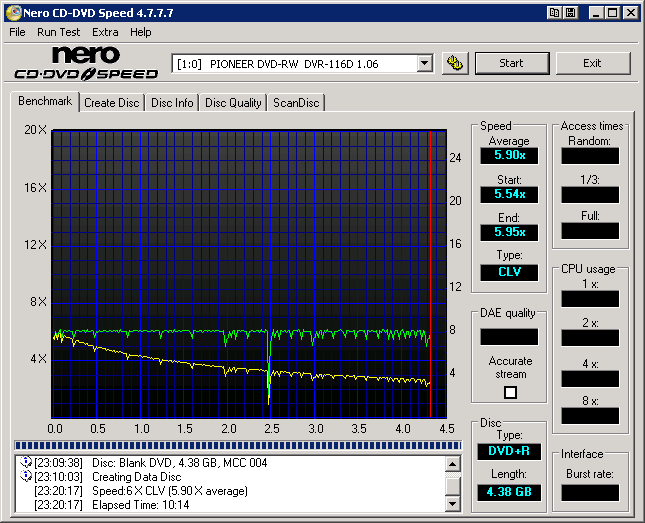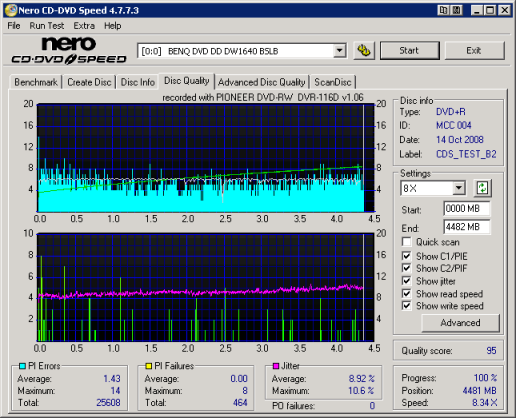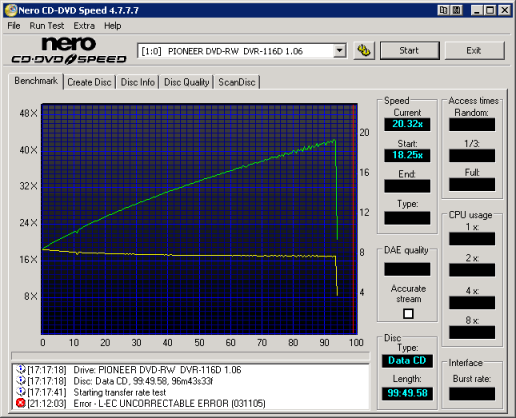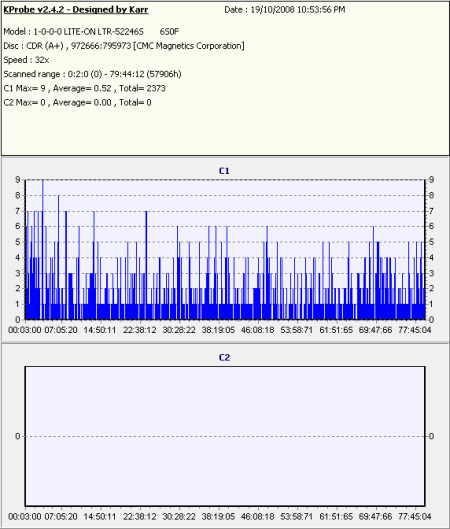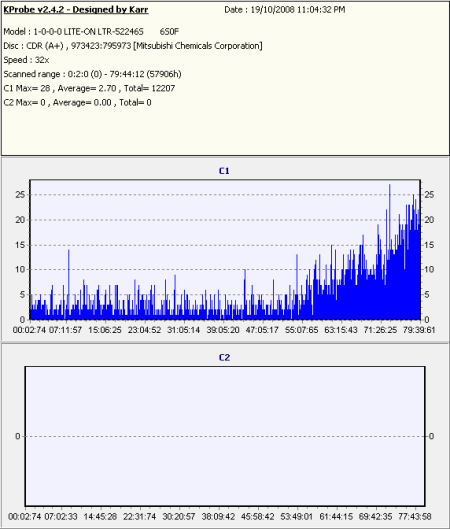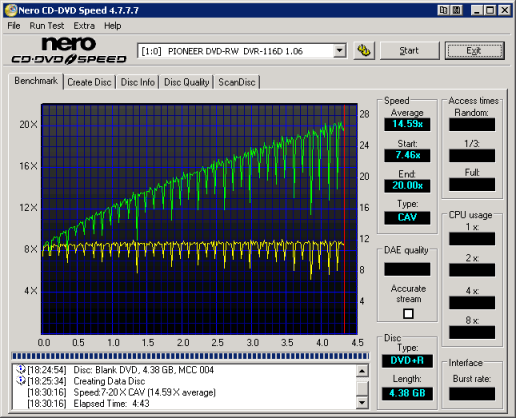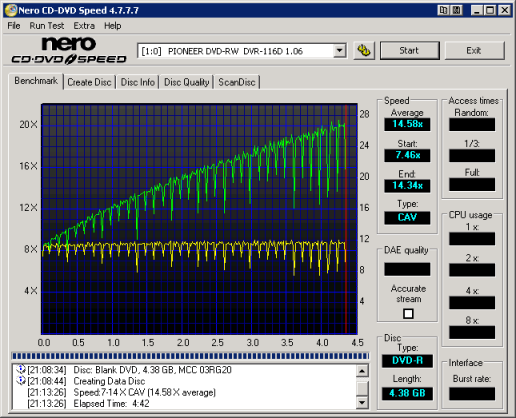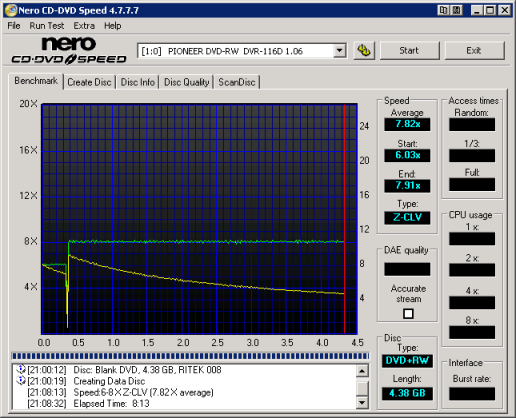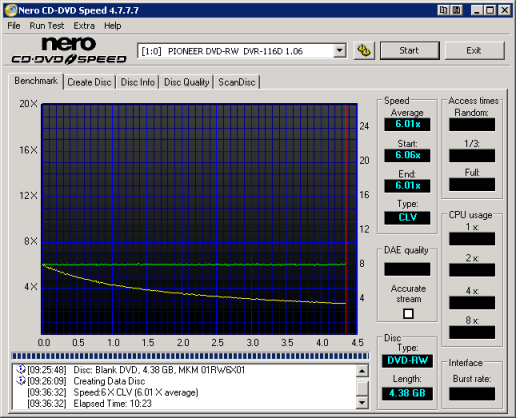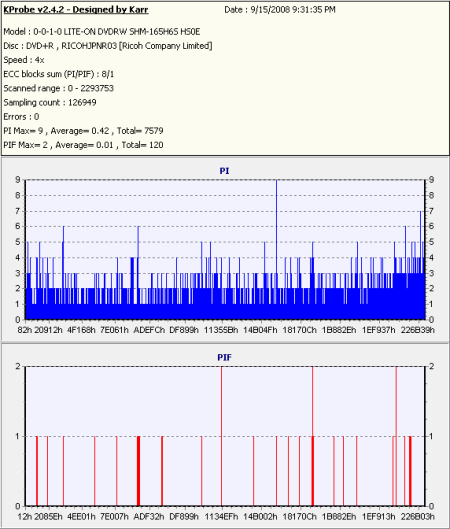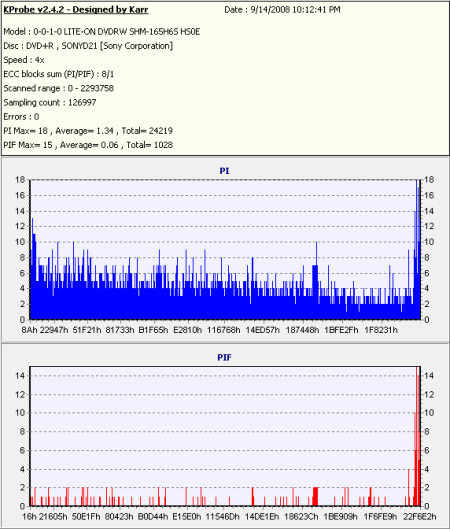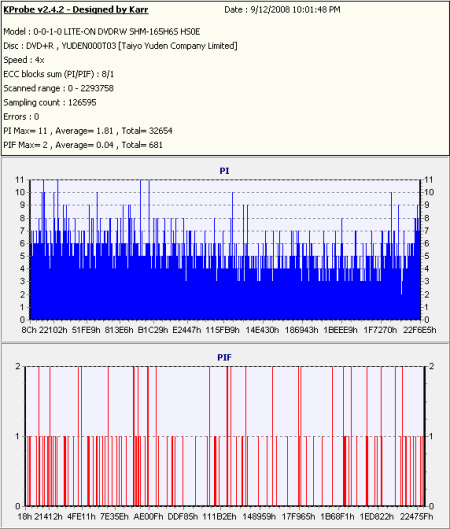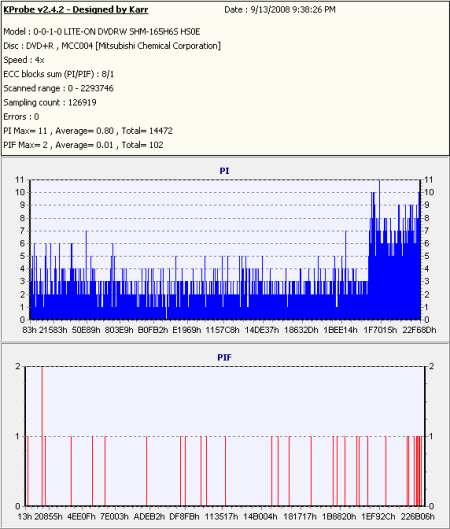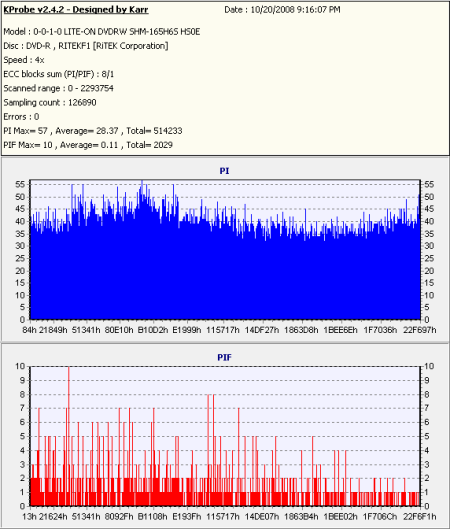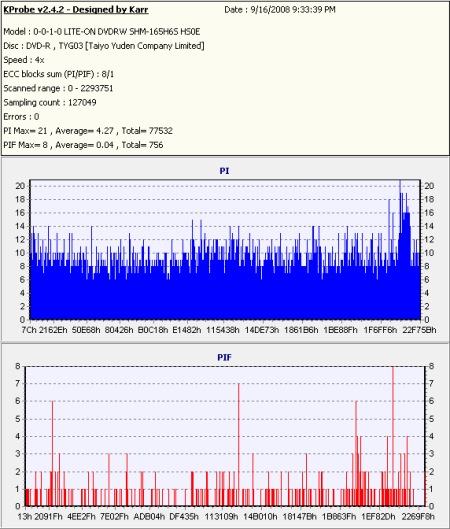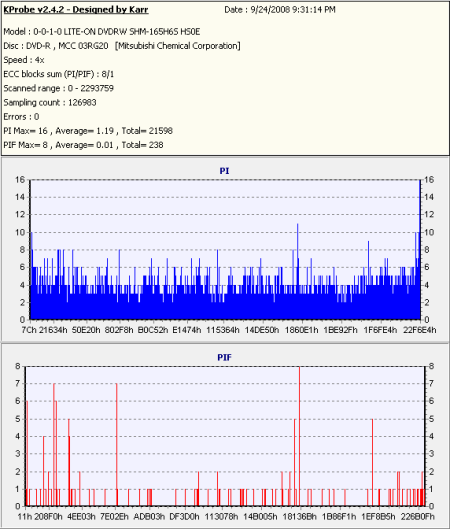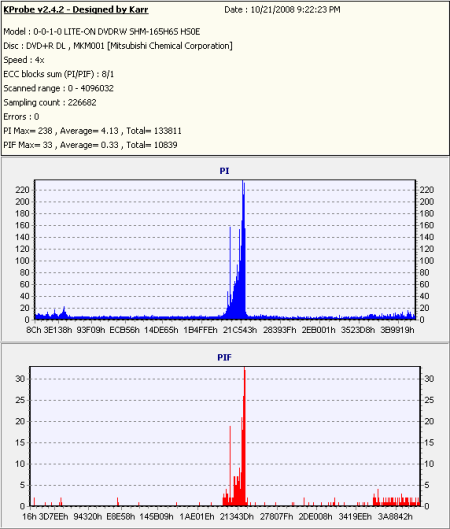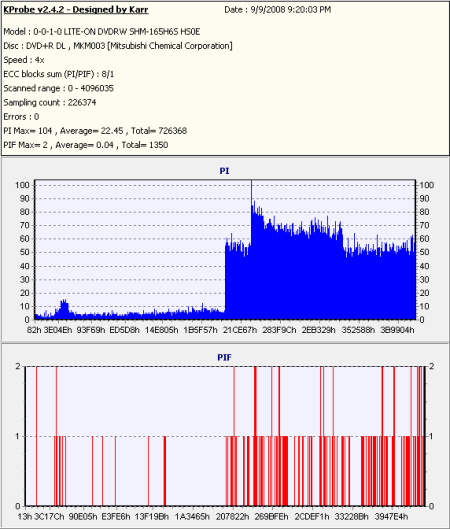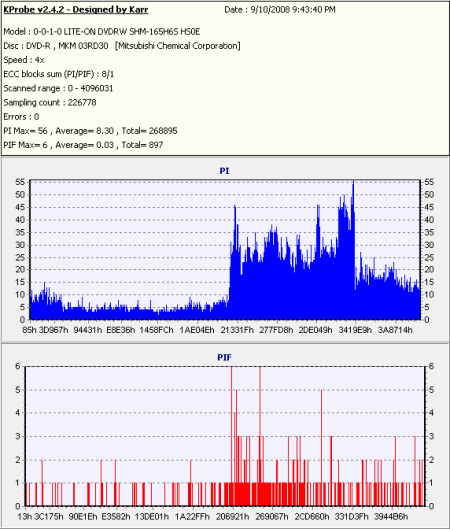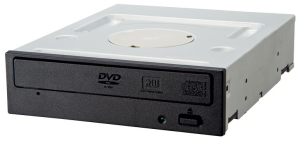

Model: Pioneer DVR-116D 20x DVD±RW
Manufacturer: Pioneer Electronics
Pioneer has been a leader in the consumer electronics industry for more than five decades. While best known for their audio and video products for the home and car, they're no stranger to the world of optical storage. In fact, the optical storage industry probably wouldn't be where it is today without them. From the development of the DVD-R and DVD-RW formats to the introduction of the world's first DVD recorder, Pioneer has been a major influence upon much of the technology used today.

While Pioneer has begun to introduce drives based on the Blu-ray Disc format, they haven't abandoned the DVD quite yet. This spring, the company announced two new 20x DVD writers, the DVR-116D and DVR-216D. Featuring some of the fastest DVD reading and writing speeds available, the two drives are capable of 20x DVD±R, 12x DVD±R DL, 8x DVD+RW and 6x DVD-RW writing speeds and a maximum DVD read speed of 16x. The DVR-116D and DVR-216D also feature internal mechanisms to reduce noise and protect against dust as well as support for Pioneer's Optimum Write Speed technology. This new technology automatically adjusts the writing speed to deliver the best writing quality possible.
As it's been some time since we've had one of their DVD writers in the 'Labs, the fine folks at Pioneer Electronics were more than willing to send us a DVR-116D to review. To give you an idea of what to expect from Pioneer's new writer, we'll take a look at some of the drive's features and then see how it compares to the 20x DVD±RW drives from the competition. Can the DVR-116D deliver the features and performance we've come to expect from Pioneer? Is it the fastest DVD writer around? Keep reading as we find out.
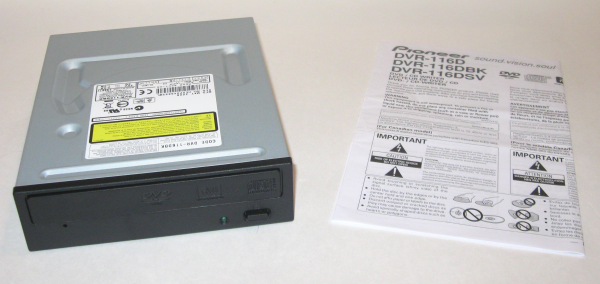
The DVR-116D we received from Pioneer was the bulk, or OEM, version. While they were able to provide a copy of the operating instructions, the drive did not come with anything else.
Physical Features:
The drive Pioneer sent us for this review was manufactured in May of 2008 and had firmware 1.03. For this review the drive's firmware has been updated to version 1.06.

Pioneer's new DVD writer definitely doesn't get any bonus points for looks. Like their previous drives, they've kept the look of the DVR-116D very simple. There are no large Pioneer logos or anything advertising the drive's reading and writing speeds. If you look closely though, you can see logos advertising support for Ultra Speed CD-RW media and the DVD+ReWritable and DVD Multi specifications.

Below the tray you can see the DVR-116D's single LED. Off by default, this LED lights up green when the drive is reading or writing.
The rear of the DVR-116D looks very similar to Pioneer's other DVD writers. By looking at the picture below you can see the drive's IDE interface, power connector and analog audio output connector.

Starting from the left of the IDE connection you'll see the jumper switch for master, slave and cable select. By default the drive's jumper comes set to master. To the left of the jumper block is the analog audio connector.
Technical Specs:
The specs below have been taken from Pioneer's website and the manual that came with the drive.
| Pioneer DVR-116D 20x DVD±RW | |
| CD Write Speeds | 40x (CAV) 32x, 24x (P-CAV) 16x, 10x, 4x (CLV) |
| CD Rewrite Speeds | 32x, 24x (Z-CLV) 16x, 10x, 4x (CLV) |
| DVD+R Write Speeds | 20x, 18x, 16x, 8x (CAV) 12x (P-CAV) 12x, 8x (Z-CLV) 6x, 4x, 2.4x (CLV) |
| DVD+RW Write Speeds | 8x (Z-CLV) 6x, 4x, 3.3x, 2.4x (CLV) |
| DVD-R Write Speeds | 20x, 18x, 16x, 8x (CAV) 12x (P-CAV) 12x, 8x (Z-CLV) 6x, 4x, 2x, 1x (CLV) |
| DVD-RW Write Speeds | 6x, 4x, 2x, 1x (CLV) |
| DVD+R DL Write Speeds | 12x, 10x, 8x (Z-CLV) 6x, 4x, 2.4x (CLV) |
| DVD-R DL Write Speeds | 12x, 10x, 8x (Z-CLV) 6x, 4x, 2x (CLV) |
| DVD Read Speeds | 16x Max (DVD-ROM Single Layer) 12x Max (DVD-ROM Dual Layer) 16x Max (DVD±R) 13x Max (DVD±RW) 12x Max (DVD±R DL) 5x Max (DVD-RAM) |
| CD Read Speeds | 40x Max (CD-ROM/CD-R) 32x Max (CD-RW) |
| DAE Speed | 40x Max |
| Buffer Size | 2 MB |
| Random Access Times |
120 ms (CD) 130 ms (DVD) |
| CD Formats | CD-DA CD-ROM CD-ROM XA CD-R CD-RW CD-Extra (CD PLUS) Photo CD Video CD CD Text |
| DVD Formats | DVD-ROM DVD-R/RW DVD+R/RW DVD+R DL DVD-R DL DVD-RAM |
Optimal Write Speed:
The DVR-116D is one of the first drives to feature Pioneer's new Optimal Write Speed technology. According to Pioneer, this function automatically adjusts the writing speed to deliver the best writing quality possible.
Optimal Write Speed is disabled by default on the DVR-116D. However, it can be enabled using the utility shown below. Using this utility, you can also check the status of the drive and save the optimal writing speed to the drive.
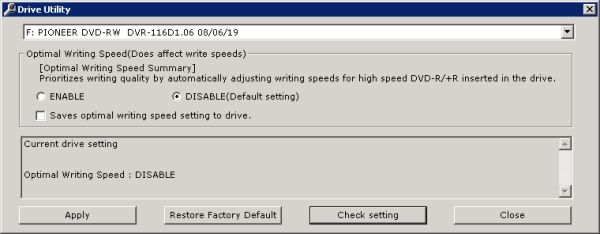
With Optimal Write Speed enabled, the DVR-116D wrote to Verbatim's 16x DVD+R media at about 6x, taking more than 10 minutes to burn an entire disc. While this is more than double the time it would take to burn a disc at 20x, the writing quality was considerably better than what we saw in our performance tests.
More Features:
By looking at the picture below, you can see that Pioneer's new DVD writer is identified as a "PIONEER DVD-RW DVR-116D."
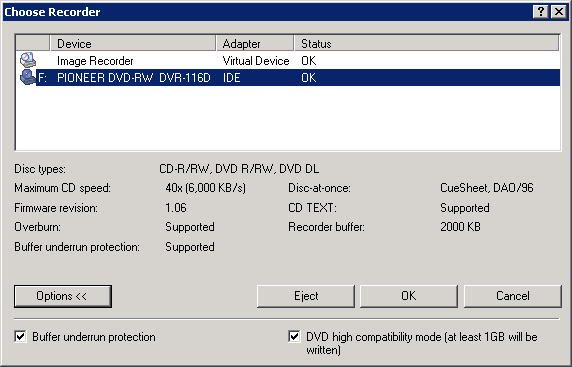
Nero shows that the DVR-116D has a maximum CD writing speed of 40x and a 2000KB buffer, which is backed up by some form of buffer underrun protection. According to Nero, the drive can also write CD-Text and overburn. When testing the drive's capacity I found that the drive was able to overburn up to 94:27 with CompUSA's 99 minute CD-R media.
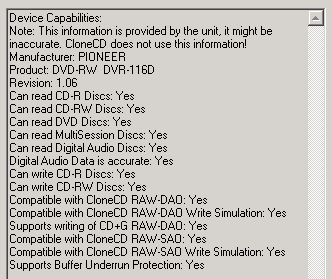
Using Alex Noe's Weak Sector Utility I was able to determine that the DVR-116D is a "two sheep" burner. This means that Pioneer's new drive is capable of backing up titles protected by SafeDisc 2, including version 2.51.
Here is a screen shot from Nero's InfoTool. This program queries the drive to see what its reading and writing capabilities are. InfoTool had no problems detecting the DVR-116D's maximum reading and writing speeds, recording modes, buffer underrun protection and 2MB buffer.
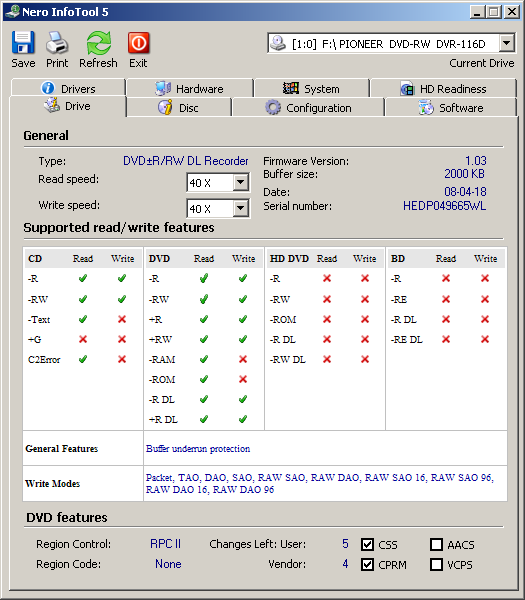
InfoTool also shows that the DVR-116D is an RPC-2 DVD drive. This means that the drive's region is stored in the firmware. The region can be changed five times and after that it cannot be changed anymore. While there isn't an RPC-1 firmware available for the drive, there is a utility available that can make the drive region free.
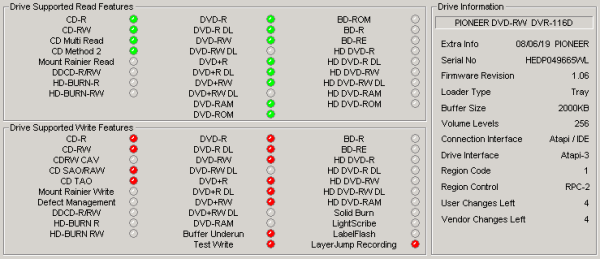
While InfoTool gives us a quick glance at the DVR-116D's features, DVDINFOpro provides a little more information on some of the drive's reading and writing capabilities. By looking at the screenshot above you can see that while Pioneer's new drive can read and write to most DVD formats, it does not support technologies like LightScribe or Labelflash.

The DVR-116D doesn't let you set the book type of single layer DVD+R or DVD+RW media. However, the drive automatically sets the book type for DVD+R DL discs to "DVD-ROM". This greatly reduces compatibility problems, especially with older DVD players.
Like Pioneer's previous DVD writers, the DVR-116D isn't short on features. The drive supports most CD and DVD formats and offers some pretty impressive specs. The DVR-116D is capable of 20x DVD±R, 12x DVD±R DL, 8x DVD+RW and 6x DVD-RW writing speeds and a maximum DVD read speed of 16x. The DVR-116D also includes features like a 2MB buffer, noise reducing mechanisms and support for Pioneer's new Optimal Write Speed technology. Unfortunately, it lacks bitsetting support for single layer DVD+R and DVD+RW media. Even then, the Pioneer DVR-116D scores a solid 8 out of 10 for its features.
Like the other Pioneer drives I've reviewed, the DVR-116D was very easy to install. From start to finish, the entire process took only a few minutes. I took the drive out of its bag, left the jumper set to master and installed it on the secondary IDE chain by connecting the IDE cable and power connector. When I turned on the computer, the BIOS detected it as a drive supporting UDMA 66. After making sure that DMA was enabled in the Device Manager, I was ready to go.
Documentation:
The DVR-116D comes with a set of "Operating Instructions." While not very big, this manual is well laid out and contains a fair amount of useful information. It starts out by going over the features of the DVR-116D. This includes an extensive list of specs as well as a few diagrams showing all of the buttons and connectors on the front and back of the drive. Pioneer has done a great job here as everything is labeled clearly and the functions of each are explained very well.
From there, the manual jumps right into the physical installation of the drive. Unfortunately, this section is very brief and consists mainly of some written instructions and a single diagram showing how the IDE, power and audio cables should be connected. If you're wondering how the jumpers should be configured or how to do things like enable DMA, you're out of luck. You won't find that information in the manual.
In the end, installing the DVR-116D was very easy. The documentation that Pioneer has included with the drive is brief, but should be enough to get the drive up and running. Nevertheless, I would have liked to have seen some better installation instructions as well as some information on how to do things like enable DMA. With this in mind, the DVR-116D gets an 8 out of a possible 10 for this section of the review.
While CPU, memory, OS and other variables don't often make a huge difference, there are some nonetheless. We have a computer that is used only for testing hardware. We do this so all tests can be compared reliably.
Test System:
| CPU: | AMD Athlon 64 X2 4600+ 2.4GHz | |
| Motherboard: | ASUS M2N-SLI Deluxe with BIOS 0304 | |
| Memory: | Corsair TWIN2X2048-6400 | |
| Video Card: | MSI NX7900GT-T2D256E - ForceWare v93.71 | |
| Hard Drive: | Seagate Barracuda 7200.10 SATA 3.0Gb/s 320GB | |
| Operating System: | Windows XP SP2 - NVIDIA nForce v9.16 |
For DVD writers the performance tests are broken down into four sections: CD read, CD write, DVD read and DVD write tests. Each benchmark test has been run three times. The score given is an average of the three. DMA has been enabled in device manager for all IDE devices supporting it.
CD Read Tests: For the read performance section of the CD-ROM benchmarks, CD WinBench 99 and CD Speed are used to test transfer speeds, seek times and CPU usage. For DAE testing, CD Speed is used to give an overall speed rating and is used in combination with CD DAE to see how well a drive reads scratched and dirty discs.
CD Write Tests: To test the write speeds, Nero Burning Rom is used to write 700MB to our test media. Times are recorded. To test rewrite scores, Nero is used again to time how long it takes to write 400MB of random files and directories. Then Sonic's DLA is used to test packet writing speeds. The same files are copied and pasted in Windows Explorer and timed.
DVD Read Tests: For the read performance section of the DVD benchmarks, CD Speed is used to test read speeds, seek times, and CPU usage.
DVD Write Tests: To test the DVD write speeds, Nero Burning Rom is used to write 4GB to our test media. Times are recorded. Then Sonic's DLA is used to test packet writing speeds. The same files are copied and pasted in Windows Explorer and timed.
CD Winbench 99 Scores:
| Pioneer DVR-116D |
Optiarc AD-7200S |
Samsung SH-S203N |
Lite-On DH-20A3H |
|
| CD Winbench 99 | 1880 KB/sec | 1695 KB/sec | 2140 KB/sec | 2037 KB/sec |
| Transfer Rate: Inside | 2140 KB/sec | 2800 KB/sec | 3040 KB/sec | 3040 KB/sec |
| Transfer Rate: Outside | 5730 KB/sec | 6370 KB/sec | 6450 KB/sec | 6420 KB/sec |
| Random Access Time | 103ms | 130ms | 96ms | 91ms |
| CPU Utilization | 1.83% | 2.22% | 3.12% | 0.46% |
The CD Winbench test is as close as we can get to testing every day usage. It fires off eight different applications using scripts. This tries to mimic the activities of a person loading these programs onto their own computer.
Pioneer's new DVD writer gave us some mixed performance in our CD Winbench tests. In the transfer speed tests, the drive started reading at 14.3x (2140 / 150) and reached a maximum speed of about 38.2x (5730 / 150) on the outside. While this is fairly good for a drive with a maximum read speed of 40x, the DVR-116D's overall score was not as high as some of the other DVD writers we've looked at.
CD Speed v4.7.7.7 - Pressed CD:
For this test I used a pressed CD containing one Mode 1 data track. The disc is 74:38 in size and is full of data and directories.
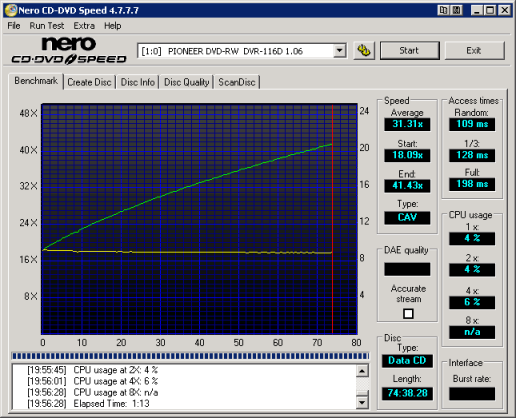
| Pioneer DVR-116D |
Optiarc AD-7200S |
Samsung SH-S203N |
Lite-On DH-20A3H |
|
| Transfer Speed Average: Start: End: |
31.31x 18.09x 41.43x |
35.50x 20.41x 46.96x |
35.96x 20.75x 47.55x |
35.81x 20.82x 47.36x |
| Seek Times Random: 1/3: Full: |
108ms 128ms 197ms |
143ms 157ms 236ms |
102ms 105ms 177ms |
98ms 110ms 184ms |
| CPU Usage 1x: 2x: 4x: 8x: |
4% 4% 6% n/a |
16% 1% 2% 4% |
0% 1% 2% 4% |
6% 1% 2% 4% |
The DVR-116D performed a little better in our CD Speed tests. While still not as fast as the other drives, it had no problems reaching a maximum speed of 41.43x.
CD Speed v4.7.7.7 - CD-R Media:
For this test I made a copy of our pressed test CD. I used 12x rated Memorex Gold 74 minute media for the tests.
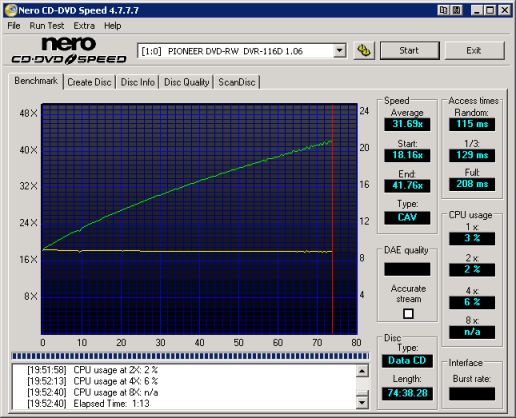
| Pioneer DVR-116D |
Optiarc AD-7200S |
Samsung SH-S203N |
Lite-On DH-20A3H |
|
| Transfer Speed Average: Start: End: |
31.69x 18.16x 41.76x |
36.25x 20.62x 48.01x |
31.30x 17.98x 41.48x |
36.59x 21.12x 48.50x |
| Seek Times Random: 1/3: Full: |
116ms 129ms 207ms |
143ms 169ms 243ms |
96ms 104ms 174ms |
105ms 116ms 181ms |
| CPU Usage 1x: 2x: 4x: 8x: |
3% 2% 6% n/a |
16% 1% 2% 4% |
0% 1% 2% 5% |
6% 4% 3% n/a |
The DVR-116D was a little faster when reading CD-R media. While this still wasn't enough to top the other drives, it reached a maximum read speed of 41.76x.
Unfortunately, Pioneer's new drive had some trouble reading our 99 minute CompUSA media. While the DVR-116D was able to recognize the disc correctly, it would not read beyond the 94 minute mark.
CD Speed v4.7.7.7 - CD-RW Media:
For this test I made a copy of a pressed test CD. I used some PNY 80 minute CD-RW media for the tests.
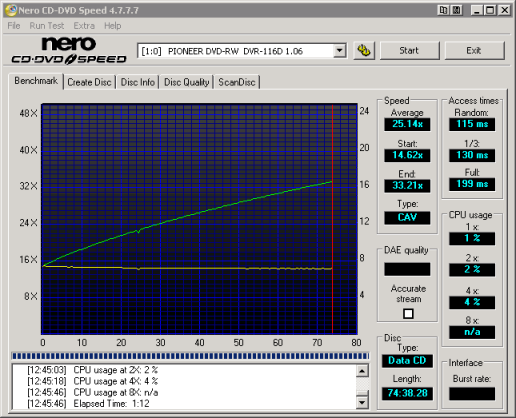
| Pioneer DVR-116D |
Optiarc AD-7200S |
Samsung SH-S203N |
Lite-On DH-20A3H |
|
| Transfer Speed Average: Start: End: |
25.14x 14.62x 33.21x |
30.71x 17.71x 40.00x |
30.74x 17.86x 40.60x |
30.12x 17.61x 39.78x |
| Seek Times Random: 1/3: Full: |
116ms 128ms 199ms |
144ms 155ms 239ms |
97ms 106ms 176ms |
102ms 112ms 182ms |
| CPU Usage 1x: 2x: 4x: 8x: |
1% 2% 5% n/a |
8% 1% 2% 3% |
0% 1% 2% 5% |
0% 4% 3% 93% |
When reading CD-RW media, the DVR-116D's transfer speeds are limited to only 32x. While Pioneer's new writer had no problems reaching this speed in our tests, it was still the slowest out of the four drives here.
CD DAE and CD Speed v4.7.7.7 (DAE) - Pressed CD:
For this test I used Pure Funk. The CD is almost exactly 74 minutes. This helps to squeeze the maximum performance out of the CD.

Exact Audio Copy can tell us a lot about a drive's capabilities. You can see from the screen shot that while the Pioneer DVR-116D supports accurate stream and has the ability to retrieve C2 error information from the CD, it does not cache audio data.
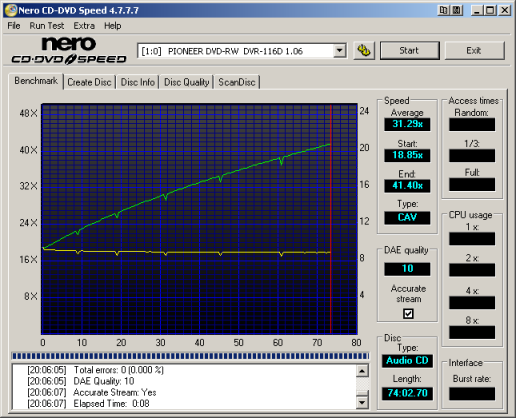
| CD Speed | Pioneer DVR-116D |
Optiarc AD-7200S |
Samsung SH-S203N |
Lite-On DH-20A3H |
| Average: Start: End: DAE Quality: Accurate Stream: |
31.29x 18.85x 41.40x 10 Yes |
30.89x 17.71x 40.00x 10 Yes |
30.93x 17.76x 40.86x 10 Yes |
30.30x 17.64x 40.03x 10 Yes |
The DVR-116D did fairly well in our DAE tests. While not nearly as fast as some of the other DVD writers we've tested, it had no problems ripping pressed audio CD's at 41x.
CD DAE and CD Speed v4.7.7.7 (DAE) - CD-R Media:
For this test I used a copy of the Pure Funk CD. It's burned onto the same Memorex Gold 74 minute media I used in the CD Speed tests.
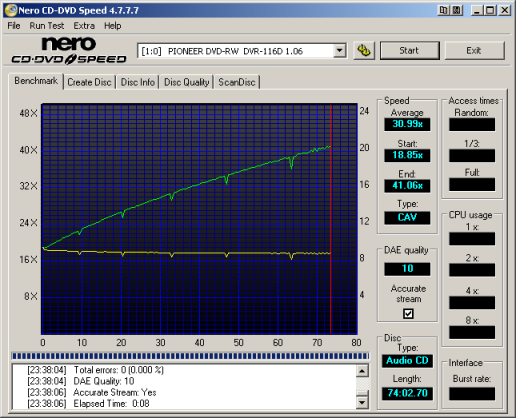
| CD Speed | Pioneer DVR-116D |
Optiarc AD-7200S |
Samsung SH-S203N |
Lite-On DH-20A3H |
| Average: Start: End: DAE Quality: Accurate Stream: |
30.99x 18.85x 41.06x 10 Yes |
30.62x 17.69x 40.01x 10 Yes |
30.64x 17.74x 40.40x 10 Yes |
30.02x 17.51x 39.59x 10 Yes |
While the DVR-116D was a little slower when extracting audio from CD-R media, this didn't keep it from reaching a maximum DAE speed of 41x. So how did it do in CD Speed's advanced DAE tests? Take a look below.
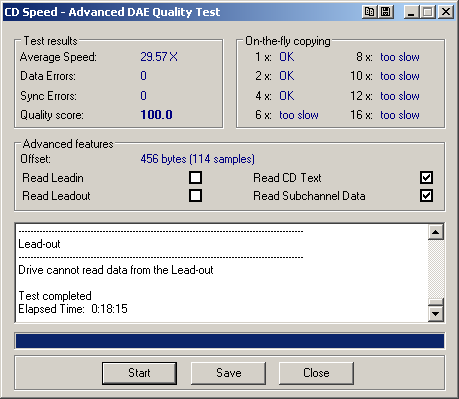
Pioneer's DVD writer completed CD Speed's advanced DAE tests with an average score of 29.57x. While the drive went through all of the tests without creating any errors, it was unable to pass all of the on the fly copying tests. If you look at the advanced features, you can see that the DVR-116D was able to read the CD-Text, subchannel data and lead in but failed to read the lead out section of the CD.
To see how well the DVR-116D can read scratched and dirty discs, I used CD Speed's ScanDisc utility to see how many sectors were damaged or unreadable. This is a very rough, but good way to test the drive's error correcting abilities.
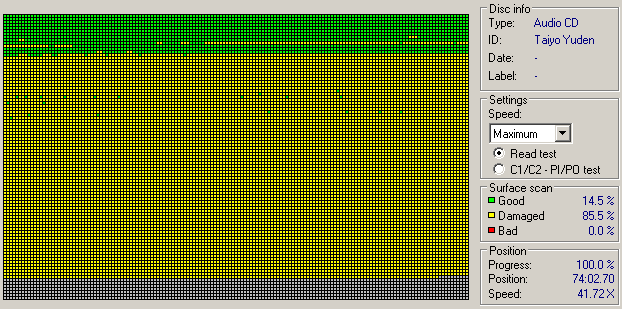
CD Speed - ScanDisc
The DVR-116D didn't handle scratched discs as well as some of the other DVD writers we've looked at recently. While there weren't any unreadable sectors on the disc, the drive considered more than 85% of the CD to be "damaged."
You can also get an idea of how well the drive can read scratched and dirty discs by using CD DAE. The application extracts the audio tracks twice and then compares them. From this information we can see what the drive's average speed was and how many errors it generated.
| CD DAE | Avg. Speed | Errors | % of Disc |
|
Pioneer DVR-116D |
25.3x | 99768247 | 12.73% |
|
Samsung SH-S203N |
29.0x | 2365653 | 0.30% |
|
Lite-On DH-20A3H |
2.2x | 2543386 | 0.33% |
The DVR-116D gave us some mixed results in this test. While the scratches on the disc had little effect on the drive's speed, the number of errors was higher than what we'd like to see.
CD Write and ReWrite Tests - Nero Burning Rom 7.11.10.0 and DLA 5.20:
For this test I randomly generated 700MB of files and directories to test the time it takes the drive to write and close a CD. All of the files are between 1MB and 25MB in size and no more than 10 directories deep. All of the times below include not only the actual writing time, but the lead in and out times too. This gives a more realistic idea of how long it takes to write a CD.
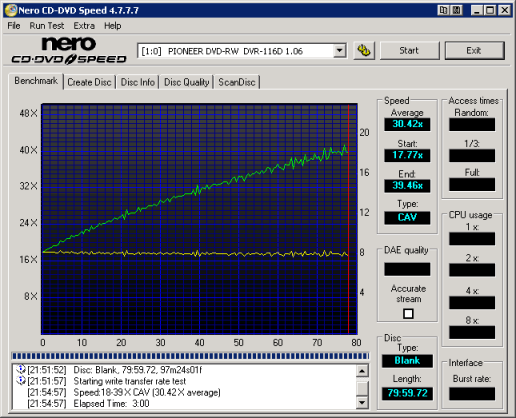
The DVR-116D has a maximum CD writing speed of 40x. To reach this speed, it uses CAV, or Constant Angular Velocity. With Taiyo Yuden's 52x media, the drive started writing at about 17.77x and reached a maximum speed of 39.46x at the end of the session. This gave Pioneer's new DVD±RW drive an average writing speed of about 30.42x.
To test the drive's writing times, I wrote our test data to some Taiyo Yuden media rated at 52x. The results are below.
| Size in MB | Size in Time | Pioneer DVR-116D |
Optiarc AD-7200S |
Samsung SH-S203N |
Lite-On DH-20A3H |
| 701MB | 79:44:21 | 3:33 | 3:12 | 2:55 | 2:46 |
Pioneer's new DVD writer went into this test with a slight disadvantage. While the other drives can write CD's at 48x, the DVR-116D has a maximum writing speed of only 40x. Nevertheless, it was able to write an entire 701MB CD in a respectable 3:33.
To test the drive's writing quality I used Lite-On IT's KProbe2. Written by Karr Wang, this utility can be used to test the number of C1 and C2 errors on a disc. For these tests I used a Lite-On LTR-52246S (firmware 6S0F) and read the discs at 32x.
The DVR-116D's writing quality was very good. By looking at the KProbe screenshots, you can see that the discs burned by the drive had a low number of C1 errors and there were no C2 errors at all.
For the rewriting tests I created 400MB of files on the hard drive and wrote them in DAO mode using Nero. To test the packet writing speeds I copied and pasted the same files off the hard drive onto a CD-RW disc using DLA from Sonic. Verbatim's 32x Ultra Speed CD-RW media was used for these tests.
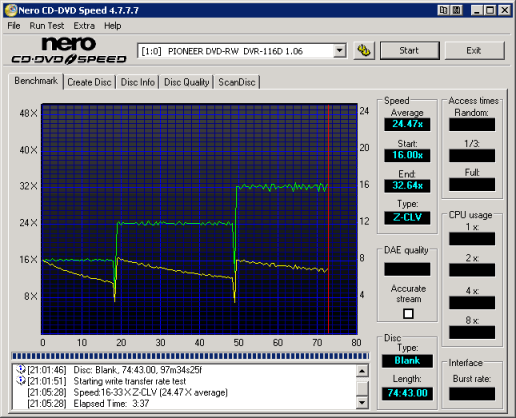
While the DVR-116D uses CAV when writing to CD-R discs, it uses Z-CLV, or Zone CLV, when rewriting at 32x. By looking at the screenshot above, you can see that it starts writing at 16x and jumps to 24x at about the 19 minute mark. The drive writes at this speed until about the 49 minute mark. At this point, the writing speed increases to 32x and stays there until the very end of the session.
| Software | Pioneer DVR-116D |
Optiarc AD-7200S |
Samsung SH-S203N |
Lite-On DH-20A3H |
| Nero | 2:40 | 2:11 | 2:22 | 2:57 |
| DLA Write | 2:46 | 2:17 | 3:26 | 2:50 |
| DLA Read | 6:02 | 1:36 | 1:16 | 1:28 |
Pioneer's new DVD writer didn't do as well as some of the other drives in our rewriting tests. Due to its Z-CLV writing method, the DVR-116D took 2:40 to write 400MB with Nero and 2:33 to do the same with DLA. For whatever reason, it also took more than 6 minutes to read the data back.
| Pioneer DVR-116D |
Optiarc AD-7200S |
Samsung SH-S203N |
Lite-On DH-20A3H |
|
| Quick Erase | 26 seconds | 16 seconds | 18 seconds | 22 seconds |
| Full Erase | 3:49 | 3:06 | 3:14 | 3:50 |
While the DVR-116D's Z-CLV writing method didn't have much of an effect on its quick erase time, the drive took 3:49 to do a full erase.
Nero CD Speed v4.7.7.7 - DVD-ROM:
For this test I used a single layer, single sided data DVD-ROM disc that is 4.37GB in size.
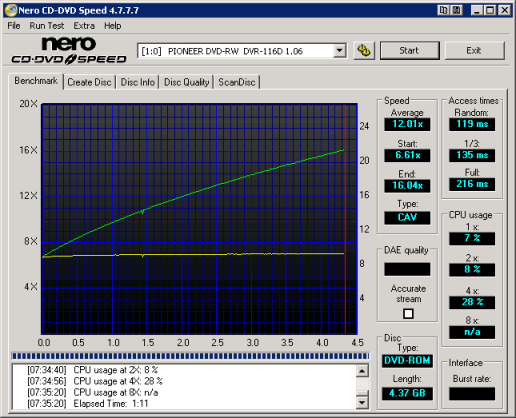
| Pioneer DVR-116D |
Optiarc AD-7200S |
Samsung SH-S203N |
Lite-On DH-20A3H |
|
| Transfer Speed Average: Start: End: |
12.01x 6.61x 16.04x |
12.03x 6.61x 16.09x |
12.14x 6.70x 16.20x |
12.12x 6.73x 16.20x |
| Seek Times Random: 1/3: Full: |
118ms 134ms 218ms |
124ms 141ms 226ms |
97ms 113ms 184ms |
103ms 119ms 173ms |
| CPU Usage 1x: 2x: 4x: 8x: |
7% 8% 28% n/a |
11% 9% 16% 29% |
9% 6% 10% 19% |
12% 9% 15% 98% |
The DVR-116D was fairly quick when reading single layer DVD-ROM's. In our tests it started reading at 6.61x and reached a maximum transfer speed of 16.04x. Unfortunately, its seek times were not as low as some of the other drives.
Nero CD Speed v4.7.7.7 - DVD-R, DVD-RW and DVD-RAM:
First, we'll look at the drive's DVD-R and DVD-RW reading performance. For this I made copies of our DVD-ROM test disc using some general use 8x DVD-R and 4x DVD-RW media from Verbatim and then ran our usual DVD read tests with CD Speed. For the DVD-RAM tests, media from Maxell was used. The results are below.
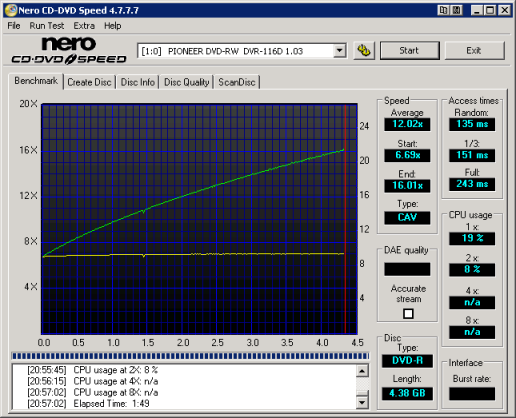
Verbatim DVD-R
| Pioneer DVR-116D |
Optiarc AD-7200S |
Samsung SH-S203N |
Lite-On DH-20A3H |
|
| Transfer Speed Average: Start: End: |
12.02x 6.69x 16.01x |
12.07x 6.62x 16.13x |
12.15x 6.71x 16.25x |
12.15x 6.70x 16.25x |
| Seek Times Random: 1/3: Full: |
136ms 152ms 243ms |
125ms 153ms 245ms |
114ms 127ms 203ms |
134ms 146ms 222ms |
| CPU Usage 1x: 2x: 4x: 8x: |
19% 8% n/a n/a |
13% 16% 24% 33% |
11% 6% 11% 23% |
27% 9% 18% n/a |
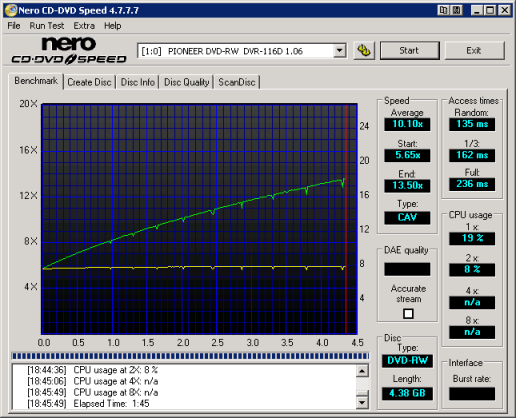
Verbatim DVD-RW
| Pioneer DVR-116D |
Optiarc AD-7200S |
Samsung SH-S203N |
Lite-On DH-20A3H |
|
| Transfer Speed Average: Start: End: |
10.10x 5.65x 13.50x |
9.78x 5.36x 13.07x |
9.03x 4.97x 12.08x |
9.03x 4.98x 12.08x |
| Seek Times Random: 1/3: Full: |
137ms 163ms 237ms |
123ms 156ms 252ms |
122ms 130ms 209ms |
148ms 159ms 256ms |
| CPU Usage 1x: 2x: 4x: 8x: |
19% 8% n/a n/a |
5% 10% 17% 30% |
9% 6% 11% 19% |
20% 10% 18% 98% |
The DVR-116D performed very well when reading DVD-R and DVD-RW media. In our tests, the drive read DVD-R discs at 16x and DVD-RW media at a respectable 13x.
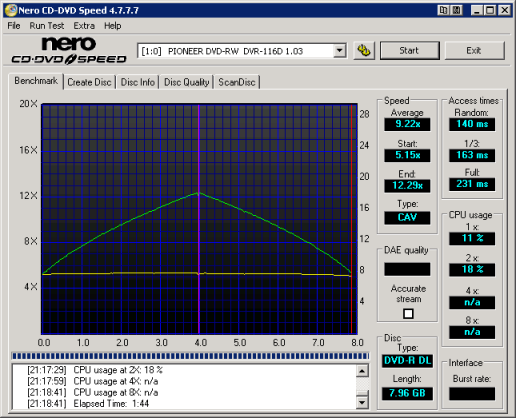
Verbatim DVD-R DL
| Pioneer DVR-116D |
Optiarc AD-7200S |
Samsung SH-S203N |
Lite-On DH-20A3H |
|
| Transfer Speed Average: Start: End: |
9.22x 5.15x 12.29x |
8.91x 4.93x 11.87x |
9.23x 5.12x 12.30x |
9.02x 5.02x 12.02x |
| Seek Times Random: 1/3: Full: |
142ms 165ms 232ms |
142ms 164ms 253ms |
125ms 140ms 213ms |
154ms 127ms 259ms |
| CPU Usage 1x: 2x: 4x: |
11% 18% n/a |
5% 8% 14% |
12% 8% 15% |
24% 12% 97% |
Pioneer's new drive had no problems reading Verbatim's 4x DVD-R DL media. The DVR-116D started reading at 5.15x and reached a maximum transfer speed of 12.29x.
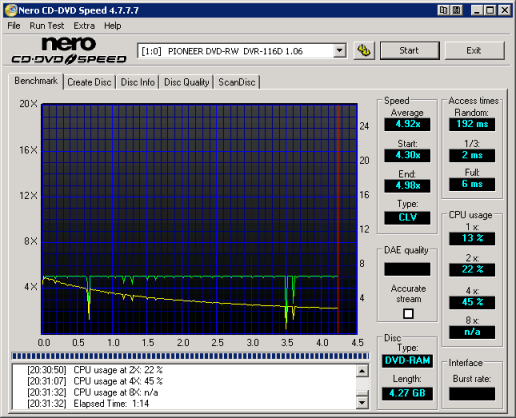
Maxell 5x DVD-RAM
| Pioneer DVR-116D |
Optiarc AD-7200S |
Samsung SH-S203N |
Lite-On DH-20A3H |
|
| Transfer Speed Average: Start: End: |
4.92x 4.30x 4.98x |
10.06x 5.91x 11.99x |
10.19x 5.93x 12.02x |
10.21x 5.94x 12.02x |
| Seek Times Random: 1/3: Full: |
191ms 2ms 6ms |
205ms 251ms 274ms |
147ms 152ms 245ms |
122ms 135ms 240ms |
| CPU Usage 1x: 2x: 4x: 8x: |
13% 22% 45% n/a |
13% 12% 18% n/a |
9% 10% 12% 20% |
12% 9% 20% 34% |
The DVR-116D has a maximum transfer speed of 5x when reading DVD-RAM discs. By looking at the screenshot, you can see that it reads at this speed from start to finish. For whatever reason, the 1/3 and full seek times were much lower than they should have been.
Nero CD Speed v4.7.7.7 - DVD+R and DVD+RW:
Next we'll look at the drive's DVD+R and DVD+RW reading performance. For this I made a copy of our DVD-ROM test disc using some 8x DVD+R and 8x DVD+RW media from Verbatim. I then ran our usual DVD read tests with CD Speed. The results are below.
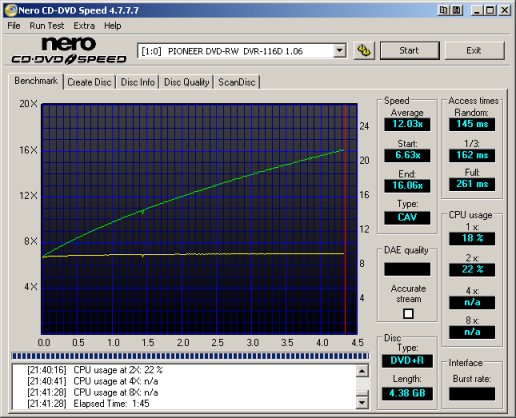
Verbatim DVD+R
| Pioneer DVR-116D |
Optiarc AD-7200S |
Samsung SH-S203N |
Lite-On DH-20A3H |
|
| Transfer Speed Average: Start: End: |
12.03x 6.63x 16.06x |
12.06x 6.63x 16.12x |
12.14x 6.71x 16.23x |
12.14x 6.74x 16.23x |
| Seek Times Random: 1/3: Full: |
143ms 160ms 259ms |
124ms 150ms 246ms |
125ms 129ms 211ms |
128ms 143ms 209ms |
| CPU Usage 1x: 2x: 4x: 8x: |
18% 22% n/a n/a |
11% 10% 16% 29% |
13% 11% 20% 34% |
28% 9% 17% n/a |
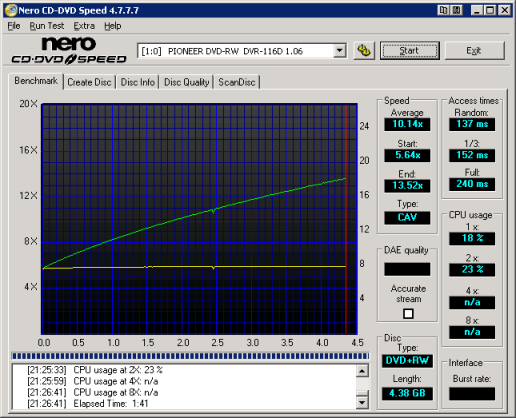
Verbatim DVD+RW
| Pioneer DVR-116D |
Optiarc AD-7200S |
Samsung SH-S203N |
Lite-On DH-20A3H |
|
| Transfer Speed Average: Start: End: |
10.14x 5.64x 13.52x |
9.79x 5.39x 13.08x |
9.03x 4.98x 12.07x |
9.03x 5.01x 12.07x |
| Seek Times Random: 1/3: Full: |
137ms 152ms 240ms |
123ms 153ms 248ms |
124ms 134ms 202ms |
136ms 148ms 221ms |
| CPU Usage 1x: 2x: 4x: 8x: |
18% 23% n/a n/a |
5% 9% 16% 29% |
9% 6% 11% 19% |
19% 9% 17% 96% |
The DVR-116D's performance with DVD+R and DVD+RW media was very similar to what we saw with DVD-R and DVD-RW media. The drive read DVD+R discs at 16x and DVD+RW media at 13x.
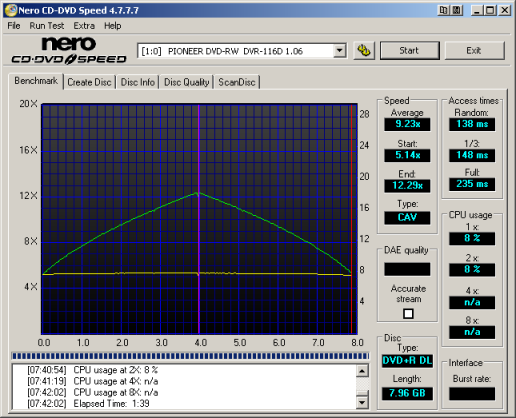
Verbatim DVD+R DL
| Pioneer DVR-116D |
Optiarc AD-7200S |
Samsung SH-S203N |
Lite-On DH-20A3H |
|
| Transfer Speed Average: Start: End: |
9.23x 5.14x 12.29x |
8.91x 4.93x 11.87x |
9.22x 5.12x 12.30x |
9.02x 5.01x 12.02x |
| Seek Times Random: 1/3: Full: |
139ms 150ms 237ms |
127ms 153ms 251ms |
131ms 146ms 213ms |
136ms 146ms 206ms |
| CPU Usage 1x: 2x: 4x: |
8% 8% n/a |
5% 7% 13% |
12% 8% 15% |
23% 12% 98% |
Reading Verbatim's double layer DVD+R media wasn't a problem for the DVR-116D either. The drive started reading at 5.14x and reached a maximum transfer speed of 12.29x.
Nero CD Speed v4.7.7.7 - DVD-Video:
For these tests I am using the US version of Transformers: The Movie on DVD. The disc is over 4GB and single sided.
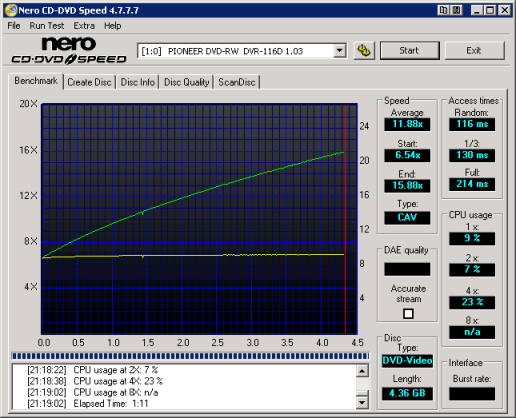
| Pioneer DVR-116D |
Optiarc AD-7200S |
Samsung SH-S203N |
Lite-On DH-20A3H |
|
| Transfer Speed Average: Start: End: |
11.88x 6.54x 15.88x |
11.91x 6.54x 15.93x |
12.00x 6.63x 16.04x |
12.00x 6.67x 16.04x |
| Seek Times Random: 1/3: Full: |
116ms 131ms 214ms |
123ms 146ms 225ms |
95ms 112ms 183ms |
104ms 122ms 174ms |
| CPU Usage 1x: 2x: 4x: 8x: |
9% 7% 23% n/a |
11% 9% 16% 29% |
9% 6% 10% 21% |
13% 9% 15% n/a |
The DVR-116D didn't slow down very much when reading single layer DVD videos. It started out at about 6.54x and reached a maximum read speed of 15.88x. Pioneer's new drive was also fairly quick when reading dual layer discs. By looking at the screenshot below, you can see that the drive's transfer speeds peaked at about 9x.
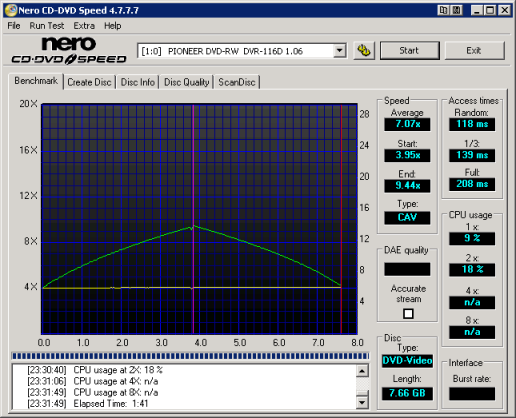
To see how well the DVR-116D worked as a DVD player, I watched a few scenes from Transformers: The Movie and Star Wars: The Phantom Menace using Nero Showtime. The drive had no problems playing back these movies with either program and was fairly quiet.
DVD Write and ReWrite Tests - Nero Burning Rom 7.11.10.0 and DLA 5.20:
To test the DVD writing performance of Lite-On's new drive I used Verbatim 16x DVD+R, Verbatim 16x DVD-R, RiDATA 8x DVD+RW and Verbatim 6x DVD-RW media. To get the writing times, a 4.38GB image was burned to our test discs using Nero.
|
|
When writing to DVD+R and DVD-R media at 20x, the DVR-116D uses CAV. By looking at the screenshots above, you can see that Pioneer's new drive starts writing at 7.46x and accelerates, reaching its maximum speed at the end of the disc.
The DVR-116D also features 8x DVD+RW and 6x DVD-RW writing speeds. While the drive uses CLV when writing to DVD-RW media, it uses Z-CLV to reach its maximum DVD+RW writing speed.
| Pioneer DVR-116D |
Optiarc AD-7200S |
Samsung SH-S203N |
Lite-On DH-20A3H |
|
| DVD+R | 4:50 | 4:57 | 4:53 | 5:11 |
| DVD-R | 4:45 | 4:38 | 4:42 | 5:07 |
| DVD+RW | 7:24 | 7:28 | 7:29 | 7:47 |
| DVD-RW | 9:59 | 10:05 | 10:01 | 10:03 |
The DVR-116D performed very well in our DVD writing tests. While not as fast as the drives from Optiarc and Samsung when writing to DVD-R discs, it turned in some very impressive times with DVD+R, DVD+RW and DVD-RW media.
While Pioneer has a list of supported media on its website, I wanted to see for myself how well the DVR-116D worked with some of the DVD+R and DVD-R discs available in my area. The media types, along with the average time it took the drive to write our 4.38GB image, are listed below. For these tests, Optimum Write Speed was left disabled.
| Manufacturer ID | Max Write Speed |
Average Write Time |
|
| Memorex 16x DVD+R | RICOHJPN R03 | 18x | 5:16 |
| Sony 16x DVD+R | SONYD21 | 18x | 5:14 |
| Taiyo Yuden 16x DVD+R | YUDEN000T03 | 20x | 4:52 |
| Verbatim 16x DVD+R | MCC-004 | 20x | 4:50 |
| RiDATA 16x DVD-R | RITEKF1 | 18x | 5:11 |
| Sony 16x DVD-R | SONY16D1 | 18x | 5:14 |
| Taiyo Yuden 16x DVD-R | TYG03 | 20x | 4:49 |
| Verbatim 16x DVD-R | MCC 03RG20 | 20x | 4:45 |
So what about writing quality? Thanks to KProbe, we can test a disc's PI (Parity Inner) and PIF (Parity Inner Fail) rates. For these tests I used a Lite-On SHM-165H6S (firmware HS0E) and read the discs at 4x with the PI and PIF ECC sums set to 8 and 1 respectively. For comparison, I also tested the discs on a BenQ DW1640. When combined with Nero CD Speed, the DW1640 is able to report PI Errors, PI Failures, Parity Outer Failures and even jitter levels. For this test, the discs are read at 8x with both the PI and PIF ECC sums set to 8.
So what are "good" results supposed to look like? With KProbe, the PI errors should not exceed 280 and the number of PIF errors should stay below 4. When testing with CD Speed, the number of PI errors should stay below 280 as well. However, because it scans with an ECC sum of 8, a higher number of PIF errors is acceptable, as long as they do not exceed 32. Since POF errors are uncorrectable, we really don't want to see any of them at all.
I also put these discs through a "stress test" by reading them back at 16x with the DW1640. By reading these discs back at this speed, we can see if there are any readability issues caused by the number of errors or high levels of jitter.
The DVR-116D's writing quality was pretty good with the DVD+R media from Memorex and Sony. In both cases, the PI/PIF rates stayed well within acceptable limits when tested with both KProbe and CD Speed. Unfortunately, the same can't be said for the discs from Taiyo Yuden and Verbatim. When scanned with BenQ DW1640, the error rates were very high near the end of the disc.
Lastly, here are some results from our DVD-R test media. Looking at the graphs above, you can see that the discs from Sony, Taiyo Yuden and Verbatim yielded some pretty good results with KProbe. Unfortunately, when scanned with the BenQ DW1640, there were a number of cases where the error rates were quite high.
| Pioneer DVR-116D |
Optiarc AD-7200S |
Samsung SH-S203N |
Lite-On DH-20A3H |
|
| DVD+RW Quick | 6 seconds | 4 seconds | 3 seconds | 4 seconds |
| DVD+RW Full | 7:21 | 7:28 | 7:28 | 7:46 |
| DVD-RW Quick | 25 seconds | 29 seconds | 28 seconds | 21 seconds |
| DVD-RW Full | 9:56 | 9:55 | 9:56 | 9:46 |
To test the DVR-116D's packet writing performance I used DLA 5.20. RiDATA 8x DVD+RW and Verbatim 6x DVD-RW media were used once again.
| Pioneer DVR-116D |
Optiarc AD-7200S |
Samsung SH-S203N |
Lite-On DH-20A3H |
|
| DVD+RW Write | 6:36 | 6:41 | 6:42 | 7:01 |
| DVD+RW Read | 8:33 | 5:49 | 6:11 | 6:19 |
| DVD-RW Write | 8:23 | 8:26 | 8:26 | 8:25 |
| DVD-RW Read | 8:32 | 5:55 | 6:13 | 6:23 |
Pioneer's new drive performed pretty well in our packet writing tests. The DVR-116D turned in some impressive times when writing to DVD-RW and DVD+RW media, but wasn't as fast as some of the other drives when reading the data back.
Double Layer DVD Write Tests - Nero Burning Rom 7.11.10.0:
To test the double layer DVD writing performance of the DVR-116D, I used DVD+R DL and DVD-R DL media from Memorex and Verbatim. I created about 8GB of random files and directories on my hard drive and then burned them to our test discs with Nero.
| Pioneer DVR-116D |
Optiarc AD-7200S |
Samsung SH-S203N |
Lite-On DH-20A3H |
|
| DVD+R DL Write | 14:30 | 18:48 | 13:08 | 16:46 |
While the DVR-116D is capable of writing at 12x, its speed was limited to 10x with Verbatim's 8x DVD+R DL media. Nevertheless, the drive performed very well, taking 14 and a half minutes to write 8001MB of data. So what about writing quality? Take a look below.
The writing quality was pretty good with Memorex's 8x DVD+R DL media. Aside from a few isolated spikes, the PI/PIF rates stayed within acceptable limits. Unfortunately, the same can't be said for Verbatim's DVD+R DL media. With their 2.4x rated discs, there was a large PI/PIF spike at the error change. Their 8x rated media yielded some fairly decent results with KProbe. However, when scanned with the BenQ DW1640, the error rates were fairly high throughout the second layer of the disc. The worst results were with MAM-A's 8x DVD+R DL media. Looking at the CD Speed screenshot, you can see that the error rates were not only high, there was a small number of PO Failures.
| Pioneer DVR-116D |
Optiarc AD-7200S |
Samsung SH-S203N |
Lite-On DH-20A3H |
|
| DVD-R DL Write | 15:04 | 18:56 | 13:33 | 17:02 |
The DVR-116D's writing speeds was also limited to 10x with Verbatim's 8x DVD-R DL media. This time around, the drive took a little more than 15 minutes to burn 8001MB of data. So what about writing quality? Take a look below.
While the writing quality was very good with Verbatim's 4x DVD-R DL media, their 8x rated discs yielded some mixed results. The error rates stayed within acceptable limits when tested with KProbe. However, when scanned by the DW1640, the PI and jitter rates were higher than we'd like to see.
Performance Revisited:
While the Pioneer DVR-116D has a few rough spots, it performed pretty well throughout most of our tests. The drive flew through our DVD writing tests, turning in some impressive times with DVD±R, DVD±RW and DVD±R DL media. Unfortunately, there were a few cases where the writing quality could have been better. Reading DVD's wasn't a problem for the DVR-116D either. The drive was able to read single layer data DVD's and DVD±R media at 16x, but slowed to only 5x when reading DVD-RAM discs.
The DVR-116D also did relatively well in our CD read tests. While not as fast as the other drives, it had no problems reading all types of media at its rated speeds. When it came to writing CD's, the DVR-116D's 40x CD-R writing speed put it at a slight disadvantage. Nevertheless, its writing quality was very good. With all things considered, the Pioneer DVR-116D gets a solid 7 out of 10 for the performance section of this review.
Pioneer drives have quite a following among enthusiasts and after having the DVR-116D in our 'Labs, it's easy to see why. While affordably priced, their new 20x DVD±RW offers features like Pioneer's new Optimal Write Speed function and some of the fastest DVD reading and writing speeds available.
The DVR-116D performed very well when writing to DVD+R and DVD-R media at 20x. At this speed, it took the drive less than five minutes to write an entire 4.7GB DVD. This level of performance carried over to our rewriting tests where the drive turned in some impressive times with DVD-RW and DVD+RW media. Without compatible media, we weren't able to test the DVR-116D's full potential when writing to DVD±R DL media. However, when writing at 10x, the drive took about 15 minutes to burn 8GB of data.
When it came to media compatibility, the DVR-116D gave us some mixed results. While the drive wrote to all of our test media at its rated speeds or better, only four types were supported at 20x. More concerning was the DVR-116D's writing quality. As we showed you in our tests, there were a number of cases where the jitter and error rates were quite high. Hopefully, Pioneer can address this in a future firmware update.
The DVR-116D also performed fairly well in our DVD read tests. While its seek times were a little higher than I would have liked, it was able to read single layer DVD-ROM's and DVD±R discs at 16x. The DVR-116D read DVD±RW discs at 13x and DVD±R DL media at speeds 12x, but slowed to only 5x when reading DVD-RAM discs.
While not as fast as some of the other drives, the DVR-116D performed as expected when reading CD's. In our tests, the drive read pressed and CD-R media at 41x and CD-RW discs at 33x. Pioneer's new drive also did fairly well when ripping audio CD's, reaching DAE speeds as high as 41x. Writing CD's wasn't a problem for the DVR-116D either. The drive's 40x CD-R writing speed did put it at a disadvantage in some of our tests. However, its writing quality was very good.
Like Pioneer's previous DVD writers, the DVR-116D also has its share of features. To prevent buffer underruns, it has a 2000KB buffer that is backed up by some sort of buffer underrun technology. While this buffer is a little smaller than we'd like to see on a 20x DVD writer, this system worked flawlessly in our tests. The DVR-116D also features an anti-dust design with noise reducing mechanisms and support for Pioneer's new Optimal Write Speed technology. Unfortunately, the drive's bitsetting capabilities are fairly limited. While the DVR-116D automatically sets the book type to "DVD-ROM" when writing to DVD+R DL discs, it lacks the ability to do the same with single layer DVD+R and DVD+RW media.
For what it offers, Pioneer's new DVD writer is surprisingly affordable. Available in your choice of black or beige, the OEM version of the DVR-116D can be picked up for less than $30 through some of the online vendors found on Pricegrabber.
| Pioneer DVR-116D 20x DVD±RW |
|
| Features: Installation: Performance: |
8 8 7 |
| Overall: | 8 |
Highs:
- Writes to DVD-R and DVD+R media at 20x
- Writes to DVD+R DL and DVD-R DL media at 12x
- Writes to DVD+RW media at 8x
- Writes to DVD-RW media at 6x
- Writes to CD-RW media at 32x
- Reads single layer DVD-ROM's at 16x
- Reads DVD±R media at 16x
- Reads DVD±RW media at 13x
- Reads DVD±R DL media at 12x
- Good selection of writing and rewriting speeds
- Includes buffer underrun prevention technology
- Good CD-R writing quality
- Features Pioneer's Optimum Write Speed technology
- Supports bitsetting for DVD+R DL media
- Affordably priced
Lows:
- Questionable writing quality with some DVD±R and DVD±R DL media
- Reads DVD-RAM media at only 5x
- Reads CD-ROM's and CD-R media at only 40x
- Writes to CD-R media at only 40x
- Cannot set the book type of DVD+R or DVD+RW media
- Overburns to only 94:27
